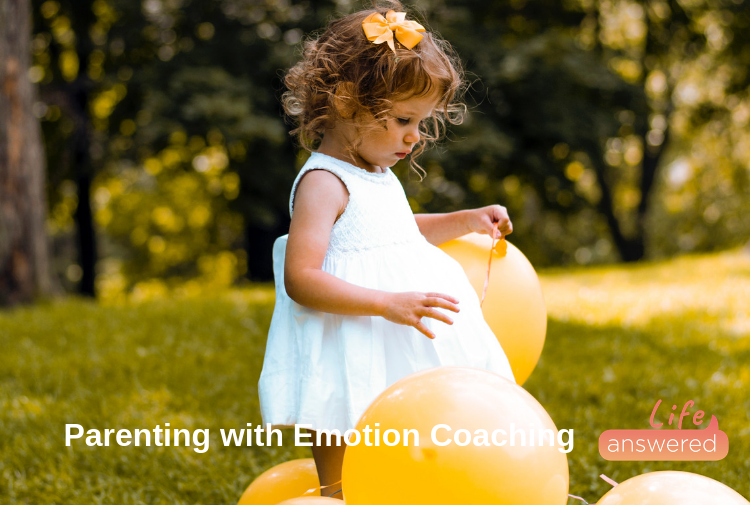
THE BENEFITS AND LIMITATIONS OF EMOTION COACHING YOUR CHILD
I’ve been hanging out with a person who has made a few comments (not always projected at me) and it has made me question my abilities as a parent. Am I doing the right thing? Am I doing the best by my children? Should I be doing better?
These questions have the ability to erode one’s sense of self and confidence.
Couple this with a 10-year-old who is asserting his authority and making demands of his own. That extra bit of friction on top of me questioning the rights and wrongs of my parenting style was making me crumble.
I needed help. So, I went online and bought three parenting books (yes, I was feeling desperate).
One was “Raising an emotionally intelligent child: the heart of parenting” by John Gottman (1997). Yes, renowned and I was hoping that he would have the answers. Gottman highlights four different parenting styles: dismissive, disapproving, laissez-faire and the emotion coacher. It has a quiz to see how you parent as well as what type of parent you are in particular situations.
Interestingly, I ranked high for the emotion coaching parent. However, while I know what to do, I knew that I didn’t do it all the time.
To me, constant and continuous emotion coaching is unrealistic. Teachers with a room full of students don’t emotion coach them for their attention every time. Employers don’t emotion coach their staff.
Have you ever heard your employer say “you would prefer to be streaming movies or at the beach, wouldn’t you? I know coming to work is boring/difficult and you would much rather be outside and not stuck in this office with no windows. I am paying you so I need your full attention to get this job done. And if you can do this, perhaps you will be able to leave on time today.”
Reflecting on my parenting, there are certain times of the day that are not negotiable. There are emotion coaching absent times of the day because we have to either be somewhere at a set time or routine has to be adhered to. These include getting to school on time and going to bed on time. We all know kids would prefer to watch TV, play with their toys at home or hang with their parent rather than go to school. It’s rare to hear a child ask to go to bed – and when they do, it’s a sign they are unwell. That is why, I have two not negotiable routines in the home.
I love the opportunity to emotion coach when my children’s feelings have been hurt. If my child is angry, I will often not emotion coach at that exact moment (even though Gottman recommends starting then) – my kids are a little older and sometimes they have to sit with their feelings, try to work through them by themselves and then are happy to talk about the situation and their feelings.
I used to get scared that my children really wanted to talk about the deep-and-meaningful topics as they were going to sleep. I was concerned that it would give them a bad night sleep or nightmares by talking about their concerns in the quiet part of their day. However, I learned that this is the perfect time to emotion coach, recount the day or talk about any topic that your child wants to cover. Our lives are so busy, there are so many devices and objects vying for our attention all of the time. It is when a child is lying in bed and the lights are off that they can hear their mind speak – they finally have the opportunity to recount their thoughts, reactions and encounters. In their safe space and with the world quiet, they have the time to process and ask the necessary (often very important) questions that have been troubling them.
It is in this moment, when I have the extra time that I cherish the emotion coaching. Learning to understand each other, listening to each other and being open and receptive to what the other is saying. Yes, situations and feelings hurt. Sometimes, we can’t change them, even though we really want to take all hurt away from our children and make everything better. We can only teach our children that some feelings just have to be accepted.
I think parents who emotion coaching 100% of the time can do their child a disservice. Equally, I believe that not emotion coaching at all (or ever) is also a disservice to the child. There are times, when a child has to learn resilience and to trust the parent; this can often happen with a simple ‘no’ (depending on the situation). I believe that there is a balance between emotion coaching and laissez-faire, disapproving and dismissing. Allowing your child to experience a sample of all types of parenting is healthy because the big-wide world can be nasty if your child isn’t prepared.
Emotion coaching does help to create a stronger connection and bond between you and your child. It does take time and effort and there are certain times that emotion coaching just isn’t feasible for some parents. However, whether you can do it a little or a lot, your child will benefit from feeling heard, feeling understood, being able to put a label on their emotions and be a more compassionate and empathetic person.
If you liked this post and would like Counselling support with your parenting matters, send your request through the Contact Page